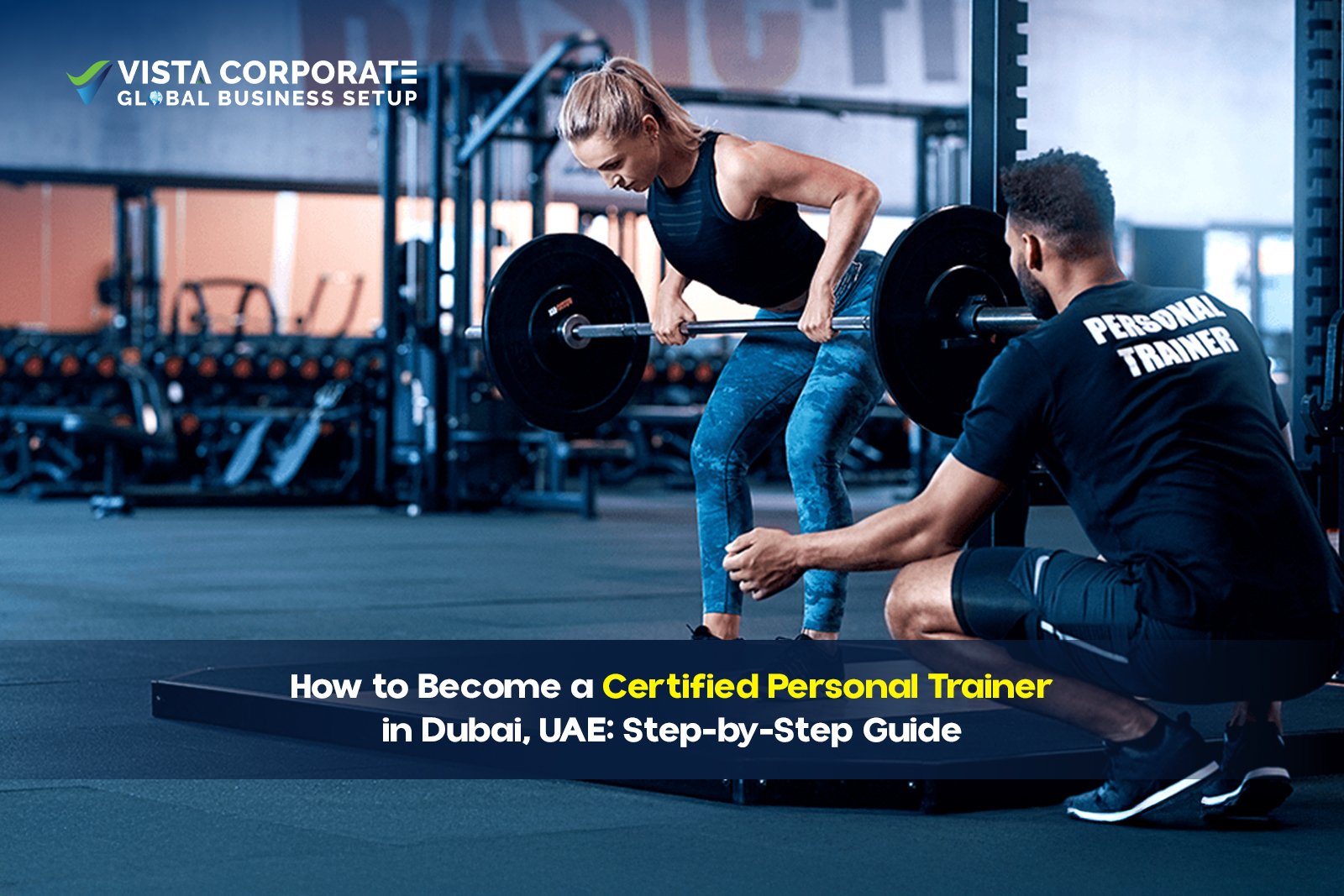
Thinking of turning your passion for fitness into a career in Dubai? Great choice, the city’s growing demand for certified personal trainers is opening up exciting opportunities for professionals ready to make an impact. But to train legally and successfully in the UAE, you’ll need to go beyond passion and meet the right Dubai fitness trainer license requirements.
In this step-by-step Dubai personal trainer certification guide, we’ll cover everything from choosing the right personal training course in Dubai to understanding REPs UAE registration and CPR/First Aid certifications. Whether you’re just starting out or planning to go freelance, this guide will help you build a solid foundation legally, professionally, and confidently.
Who’s a Certified Personal Trainer?
A certified personal trainer is a fitness professional who has completed formal training and earned credentials from a recognised body, such as NASM, ACE, ISSA, or REPs UAE, that qualify them to design and deliver safe, effective exercise programs for clients.
In Dubai, this also means meeting local standards set by authorities like the Dubai Sports Council and registering with REPs UAE to ensure your certification is officially recognised.
Certified personal trainers are trained not just in workouts, but in client assessment, injury prevention, CPR and First Aid certification, nutrition basics, and behaviour change, making them well-equipped to help clients meet health and fitness goals in a safe, professional way.
Benefits of Becoming a Personal Trainer in Dubai
Here are the top benefits of becoming a certified personal trainer in Dubai:
1. High Demand in a Health-Focused City
Dubai is pushing major wellness goals under the UAE National Sports Strategy 2031. With more people hitting gyms, parks, and even community marathons, the need for certified personal trainers in Dubai is only growing.
2. Premium Clientele & High Income Potential
From business professionals to celebrities, Dubai’s diverse population often prefers private, high-end personal training. This allows trainers to charge premium rates, especially if you hold top certifications like those recognised by REPs UAE.
3. Fitness Everywhere – Even in Malls
Dubai isn’t your average city. Malls like The Dubai Mall feature walking tracks and treadmills. Yes, inside! This shows how deeply fitness is embedded in everyday life, creating constant demand for fitness professionals.
4. Tax-Free Earnings
One of the biggest draws? No personal income tax. What you earn, you keep. Making a career in fitness is far more lucrative here compared to many Western countries.
5. Diverse Career Paths
Whether you want to work in a luxury gym, offer virtual sessions, or become a freelance personal trainer in Dubai, the city supports flexible work models. Free zones make it easy to set up your own fitness brand, too.
6. Easy Access to World-Class Facilities
Dubai gyms are known for their cutting-edge equipment, recovery centres, and wellness lounges. It’s not uncommon to train clients in facilities with cryo chambers or AI-driven machines.
7. Recognition of Global Certifications
If you’ve trained abroad, Dubai’s system allows easy REPs UAE registration for many international qualifications like NASM, ACE, or ISSA, fast-tracking your ability to work legally.
8. Year-Round Fitness Events & Expos
From Dubai Fitness Challenge to Active on the Beach, you can market your personal training business through events that attract thousands. Many trainers get booked just from participating.
9. Growing Female-Focused Fitness Industry
With more women entering the fitness space, there has been a rise in women-only gyms and a growing demand for female personal trainers- especially in areas such as pre- and postnatal fitness.
10. Supportive Government & Licensing Structure
Setting up a personal training business in Dubai is streamlined. Free zones offer freelancer licenses, and the Dubai Sports Council supports trainers through events, accreditations, and recognition.
Become a Certified Personal Trainer in Dubai: Step-by-Step Guide Process
Below are the steps you need to follow to become a personal trainer in Dubai.
Step 1: Get a Recognised Fitness Certification
You must complete a training program that is accepted in Dubai. Your certification should meet standards recognised by local fitness authorities, such as REPs UAE.
Popular certifying bodies include:
- ISSA
- NASM
- ACE
- International Sports & Fitness Academy (ISFA)
- NSCA
Step 2: Earn CPR & First Aid Certification
To keep your clients safe and meet licensing requirements, you’ll need valid CPR and First Aid certifications. You can get these from approved providers like:
- Dubai Health Authority
- Emirates Red Crescent
- St. John Ambulance
- Local certified training centres
Step 3: Apply for a Personal Trainer License
Once you have your fitness and first aid credentials, you must apply for a license to legally train clients in Dubai.
License options include:
- Freelance Personal Trainer License: Let’s you work independently. You’ll need a freelance visa and a business license (through a free zone or through Dubai’s Department of Economy & Tourism).
- Gym Employment: If a gym hires you, they typically handle the licensing and visa.
You may apply through authorities like:
- Dubai Sports Council (DSC)
- Dubai Economy & Tourism (DET)
- Relevant free zone authority (some zones allow freelance fitness licenses)
Step 4: Decide Your Work Model
After licensing, you choose how you want to operate:
- Freelance: Work with multiple clients or gyms, set your own hours and rates.
- Gym/Studio Employment: You work under a gym; they manage some administrative tasks like licensing and visas.
- Online Training: Offer virtual coaching over apps or video calls. You can reach clients beyond your local area.
Step 5: Promote Your Services & Build a Client Base
Getting certified is just the start- you need clients. Here’s how:
- Build a professional website with your services, success stories, and contact info
- Use social media platforms like Instagram, TikTok, and LinkedIn to showcase your skills
- Partner with gyms or offer workshops to get exposure
- Register on fitness platforms (e.g. REPs UAE, local fitness directories)
- Offer introductory sessions or discounts to attract first clients
Step 6: Keep Growing & Stay Current
To maintain credibility and legality, you must continually update your skills and certifications:
- Take advanced courses (nutrition, strength & conditioning, rehab, etc.)
- Attend workshops and conferences organised by fitness bodies
- Renew your license and registration as required
- Stay aware of industry trends and local fitness regulations
Dubai’s fitness scene is growing fast. Whether you want to work at a gym, freelance, or train people online, you need the proper certification, license, and approvals.
Why the Demand for Certified Personal Trainers in Dubai Is Growing
With a personal training business in Dubai, you’re stepping into a booming industry. The demand for qualified fitness professionals is on the rise, thanks to several emerging trends:
- Virtual Training Boom: With more people turning to online coaching and app-based workouts, certified personal trainers in Dubai can now reach clients far beyond the gym, even across borders.
- Health Awareness & Specialised Services: The UAE is experiencing a surge in demand for niche training areas, including pre- and post-natal fitness, weight loss, injury recovery, and athletic conditioning. Completing a personal training course in Dubai with the right specialisation can help you stand out.
- Supportive Government Initiatives: Campaigns like the Dubai Fitness Challenge and the UAE National Sports Strategy 2031 are encouraging residents to lead healthier lifestyles- fueling demand for REPs UAE-registered personal trainers.
- Tech-Driven Fitness: From wearable devices to AI-powered coaching apps, technology is shaping the future of fitness. A modern Dubai personal trainer diploma prepares you to use these tools for personalised, results-driven coaching.
Many professionals are choosing the freelance route to become a PT in Dubai, giving them control over their schedule, rates, and clientele. With the right CPR and First Aid certification in Dubai, plus REPs UAE registration, you’ll be ready to start your career with full legal compliance and credibility.
Documents Required for a Personal Trainer License in Dubai
To get your personal trainer license in Dubai, you must collect the following documents.
- Passport copy with at least six months’ validity
- UAE visa copy (if applicable)
- Passport-sized photographs
- Fitness certification from a recognised body
- First Aid and CPR certification
- Business plan (for freelance trainers)
- Fitness assessment test results (may be required by the Dubai Sports Council)
Cost of Becoming a Certified Personal Trainer in Dubai
Launching your personal training career in Dubai comes with a few essential investments. These aren’t just expenses; they’re the building blocks of your professional journey, helping you establish credibility, ensure compliance, and create a sustainable fitness business.
Here’s what typically goes into it:
- Fitness Certification: The foundation of your qualifications and the first step toward professional credibility.
- CPR & First Aid Training: A legal requirement and a critical skill for client safety.
- REPs UAE Registration: Confirms that your credentials meet the standards set by local fitness authorities.
- Professional Liability Insurance: Protects you from legal and financial risks in case of accidents or claims.
- Marketing & Equipment: Whether it’s branding, website development, or workout gear, these are key to standing out in a competitive market.
- Freelance License or Gym Sponsorship: Choose to operate independently or under a fitness centre, each with its own process and costs.
Planning these steps properly ensures you’re not just certified but also fully prepared to thrive in Dubai’s fast-growing fitness industry.
Educational & Certification Requirements to Become a Personal Trainer in Dubai
If you’re planning to become a certified personal trainer in Dubai, you’ll need to meet specific qualifications before you can legally train clients. These include both educational and regulatory standards to ensure you’re fully prepared and compliant.
- Recognised Fitness Certifications: You must complete a certification course from a globally or UAE-recognised institution, such as:
- International Sports Sciences Association (ISSA)
- National Academy of Sports Medicine (NASM)
- American Council on Exercise (ACE)
- Other ICREPs-accredited bodies
- CPR and First Aid Training: A valid CPR and First Aid certification in Dubai is mandatory, as safety is a top priority when working with clients.
- REPs UAE Registration: Your certification must align with the standards set by the Register of Exercise Professionals (REPs UAE). This is a key step in the REPs UAE registration process, ensuring your qualification is accepted locally.
- Optional Work Experience: While not always required, some gyms and employers may prefer candidates with prior hands-on experience.
Once you tick all these boxes, you can move forward confidently in launching your personal training business in Dubai.
Advanced Certifications for Personal Trainers in Dubai
To boost your credibility and unlock higher income opportunities as a personal trainer in Dubai, it’s a smart move to pursue specialised certifications. Here are a few valuable ones to consider:
Sports Conditioning: Perfect if you want to train athletes or clients focused on performance and strength.
Pre/Postnatal Fitness: Equips you to safely train pregnant clients or new mothers with tailored fitness programs.
Nutrition Coaching: Enables you to offer well-rounded fitness plans by guiding clients on healthy eating habits.
Injury Prevention & Rehabilitation: Ideal for working with clients recovering from injuries or looking to prevent them through corrective exercises.
Adding these specialities can help you attract a wider range of clients and charge premium rates for expert-level services.
10 Pitfalls to Avoid When Becoming a Personal Trainer in Dubai (and How to Tackle Them)
Becoming a certified personal trainer in Dubai comes with exciting opportunities, but there are a few common missteps that can hold you back. Here are 10 pitfalls many new trainers face, and how you can avoid them while building a successful fitness career:
1. Skipping REPs UAE Registration
The Pitfall: Your international certification might not automatically be valid in Dubai.
Fix: Complete the REPs UAE registration process to ensure your qualifications are recognised locally.
2. Choosing Unrecognised Certifications
The Pitfall: Not all online personal training courses are valid in the UAE.
Fix: Enrol in a personal training course in Dubai from a globally accredited body approved by REPs UAE.
3. Ignoring CPR and First Aid Certification
The Pitfall: This is not optional. It’s required for legal licensing.
Fix: Complete an approved CPR and First Aid certification in Dubai through recognised training centres.
4. Starting Without a License
The Pitfall: Freelancing without a license can lead to fines or a ban.
Fix: Apply for the proper Dubai fitness trainer license through the Dubai Sports Council, DET, or a free zone.
5. Overlooking Legal Business Setup
The Pitfall: Operating without a legal structure can limit your growth and lead to compliance issues.
Fix: Work with setup experts to legally launch your personal training business, especially if you want to freelance.
6. Setting Unrealistic Pricing
The Pitfall: Charging too much or too little without market research can drive clients away.
Fix: Research what other freelance personal trainers in Dubai are charging based on experience, niche, and target audience.
7. Underestimating Marketing Needs
The Pitfall: Assuming word-of-mouth alone will get you clients.
Fix: Build a strong online presence. Website, Instagram, and client testimonials are key.
8. Lack of Specialisation
The Pitfall: Being a generalist in a competitive market won’t help you stand out.
Fix: Explore niches such as pre- and postnatal training, sports conditioning, or weight loss programs to enhance your value.
9. Not Staying Updated
The Pitfall: Sticking to outdated training methods or ignoring new trends.
Fix: Attend workshops, renew certifications, and follow Dubai Sports Council updates to stay ahead.
10. Ignoring Work-Life Balance
The Pitfall: Overbooking clients or neglecting your own health can lead to burnout.
Fix: Set realistic schedules, take breaks, and practice what you preach. Your energy is your brand.
Avoiding these pitfalls not only keeps your career on track but also helps you build a reputation as a trusted, qualified, and successful personal trainer in Dubai.
Ready to Start Your Journey?
If you’ve made it this far, it’s clear you’re serious about becoming a certified personal trainer in Dubai, and that’s a great place to be. Whether you’re passionate about fitness, looking to switch careers, or dreaming of launching your own personal training business in Dubai, the path is absolutely achievable with the right steps.
Start by getting certified from a REPs-approved provider, secure your Dubai fitness trainer license, complete your CPR and First Aid certification, and choose a work model that fits your lifestyle: freelance, employed, or even online.
Yes, it takes planning. Yes, there’s paperwork. But once you’re licensed and legal, you’re not just a fitness coach, you’re a business owner, a motivator, and a recognised professional in one of the world’s fastest-growing wellness markets.
So, what’s next? Review your qualifications, pick a course, and start setting things in motion. Dubai is ready for more skilled trainers, and one of them could be you.
Vista Business Setup helps aspiring fitness professionals become certified personal trainers in Dubai by streamlining the entire licensing process. From securing your freelance or gym-sponsored license to handling REPs UAE registration, CPR certification, and business setup in the right free zone, we take care of the paperwork so you can focus on building your fitness career legally and confidently.
Ready to swap spreadsheets for squats? Let Vista handle the paperwork while you pump up the passion.
Contact Us Today!
FAQs
1. Do I need a license to work as a personal trainer in Dubai?
Yes, whether you’re working independently or employed by a gym, a personal trainer license is mandatory to operate legally in Dubai.
2. What certifications are accepted for personal training in Dubai?
Certifications from recognised international bodies like ISSA, NASM, ACE, and those accredited by ICREPs are accepted, provided they align with REPs UAE standards.
3. What is REPs UAE, and why is registration important?
The Register of Exercise Professionals (REPs UAE) validates fitness qualifications in the UAE. You must register with REPs UAE for your certification to be legally recognised in Dubai.
4. Can I work as a freelance personal trainer in Dubai?
Yes, but you’ll need to apply for a freelance license through a free zone or the Department of Economy & Tourism, along with the proper visa and registration.
5. Is CPR and First Aid certification mandatory?
Yes, it’s a legal requirement. You must have up-to-date CPR and First Aid certification to apply for a personal trainer license in Dubai.
6. How long does it take to become a certified personal trainer in Dubai?
Depending on the course and your pace, certification can take anywhere from 4 weeks to 6 months. Licensing and business setup can take additional time.
7. Do I need prior experience to work in Dubai as a personal trainer?
Not always, but some gyms may prefer or require previous work experience. If you’re freelancing, a strong portfolio helps attract clients.
8. Can international trainers move to Dubai and start working immediately?
Not immediately. You must have your qualifications validated through REPs UAE, get your CPR/First Aid certification, and apply for a license and visa.
9. Can I offer virtual training as a Dubai-based personal trainer?
Absolutely. Many trainers run online sessions. However, you still need a valid personal trainer license in Dubai if you’re based there.
10. How can Vista Business Setup help me become a certified personal trainer in Dubai?
Vista handles the entire process, freelance license setup, REPs UAE registration, visa support, and business formation, so you can focus on building your fitness career.
Disclaimer: The information provided in this guide is for general awareness purposes only and does not constitute legal or professional advice. Regulations, licensing requirements, and costs related to becoming a certified personal trainer in Dubai may change based on updates from UAE authorities such as the Dubai Sports Council, REPs UAE, or free zone jurisdictions. Readers are encouraged to consult official government sources or professional business setup consultants to obtain the most accurate and up-to-date information specific to their situation.




